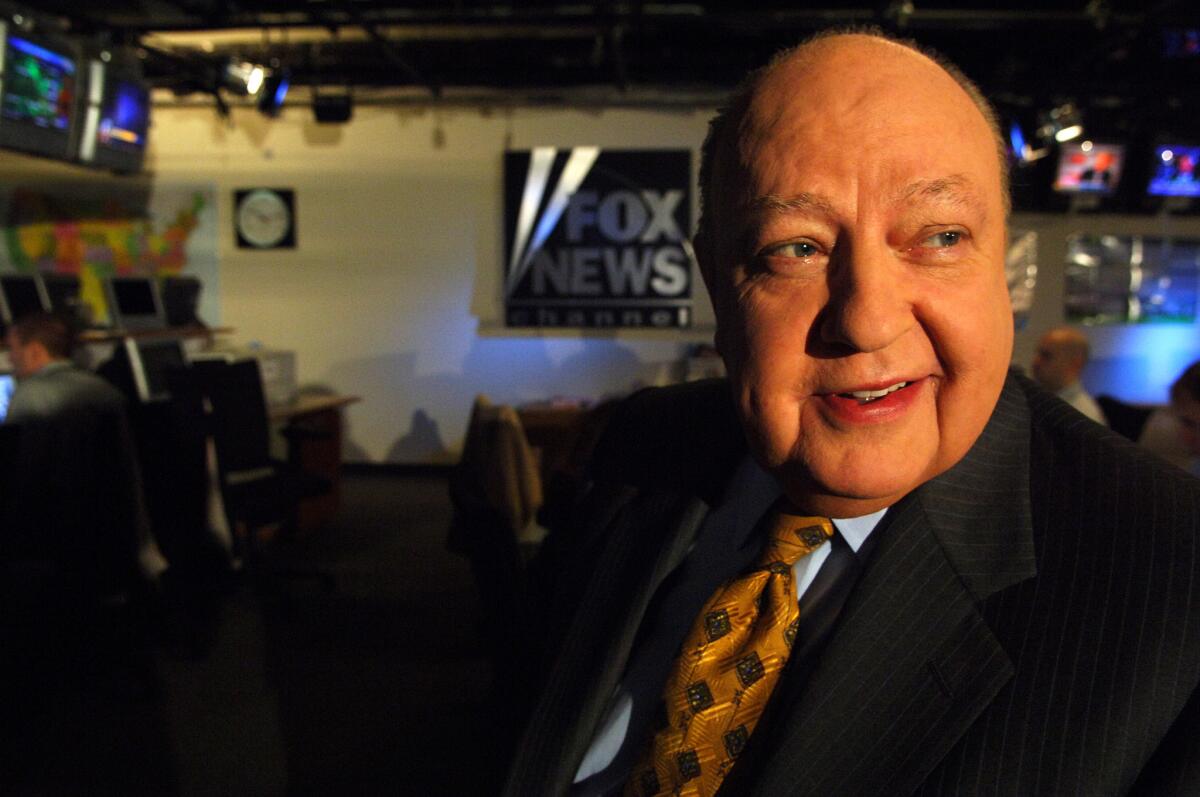Fox appoints itself a GOP primary gatekeeper

- Share via
It’s finally official: Roger Ailes, the president of Fox News, will decide which candidates can compete in Republican presidential primaries next year.
------------
FOR THE RECORD
GOP debate: Doyle McManus’ column on the rules for the first Republican presidential debate stated Roger Ailes is president of Fox News. He is its chairman and chief executive. A photo caption said the date of the first 2015 GOP debate is Aug. 5. It is Aug. 6.
------------
Think I’m exaggerating?
The rules Fox recently announced for the first GOP debate Aug. 6 make the cable network a more influential player in the campaign than ever before.
Fox has said it will allow only 10 candidates onto the stage, and it will choose them according to their standing in the five most recent national polls. Candidates who miss the cut are basically out of luck.
“That first debate is huge,” Republican strategist David Winston told me. “That’s going to be a real sorting-out moment. Any candidate who can’t get into the first debate will be at a significant disadvantage.”
If the top-10 rule were applied today, the debate would include Donald Trump, whose potential as a presidential nominee is imaginary — but could exclude Rick Santorum, who finished second in the 2012 primary campaign, and Ohio’s John Kasich, the successful governor of the seventh-largest state.
Any rule that produces that result needs revisiting. Santorum and the neurosurgeon Ben Carson have protested that Fox’s rule could shut them out of the race before they have a real chance to compete.
And long shots sometimes do finish first. Early in the 1992 campaign, then-Arkansas Gov. Bill Clinton came in 11th in a poll of potential Democratic candidates. If Fox News had held a debate back then, Clinton wouldn’t have been allowed in the room.
But it gets worse. Fox’s rules, which the Republican National Committee has endorsed, give the network remarkable leeway over every part of the process.
Fox will choose which five polls it consults. (Its own poll will be one of them, of course.) That matters a lot: Polls aren’t infallible — or, for that matter, interchangeable.
Some report the answers they get from all registered voters; others report the responses of “likely primary voters.” And who decides which respondents are likely to vote? The pollsters, using formulas they rarely reveal in public. Depending on which polls you choose, different candidates fall below the cutoff point.
In case of a tie for 10th place, Ailes and his lieutenants could bend their rules and allow an 11th candidate in — or not. That’s up to Fox. And in this overpopulated field, a tie at the bottom is almost guaranteed. The margin of error for some national polls is more than 6%. That means six potential candidates are technically tied already: Santorum, Kasich, Louisiana Gov. Bobby Jindal, former Texas Gov. Rick Perry, South Carolina Sen. Lindsey Graham and former California Senate candidate Carly Fiorina.
One side effect, GOP strategists say, is that during the next two months, those candidates will be even more desperate to boost their name recognition — by appearing on Fox News.
Fox won’t exactly be judge, jury and executioner, but it will be rule-maker, gatekeeper and moderator.
Here’s the strangest part of this picture: Roger Ailes and Fox News are not really the ones to blame. They faced a real problem: too many candidates to fit on one stage.
If 18 candidates show up Aug. 6, the debate will be a mess. As Fox News media analyst Howard Kurtz noted, “No sustained questioning would be possible — and it would be bad television.”
That’s probably accurate, but the higher purpose of those debates — sanctioned and supervised by the RNC, remember — is to help voters choose their next presidential nominee. It’s not merely to produce good television.
It’s not news that Fox under Ailes, a former campaign advisor to President Richard M. Nixon, is influential in the GOP. This just makes it more formal.
“I tell Republicans that Fox News is generally the most efficient way, in terms of time spent, to reach conservative Republicans — even more efficient than their local news,” Winston told me.
A few maverick Republicans even argue that the cable network has become so powerful that it’s become a problem for the party, not an advantage. Bruce Bartlett, a former aide to President Reagan, wrote recently that Fox allows conservatives to engage in “self-brainwashing” and may have contributed to Mitt Romney’s 2012 defeat by making Republicans complacent about the victory they expected.
In this case, the Republican Party chose to cede power to Fox. Reince Priebus, chairman of the Republican National Committee, stepped in to limit the number of debates and allowed the network to limit the number of candidates. He didn’t have to do that.
I agree with the solution offered by political consultant Stuart Rothenberg: Fox should include more candidates, divide them into two fields and hold two debates. Two debates of seven, eight or nine candidates each would be just as good if not better than one event with 10 on stage. But then, I enjoy watching debates. Not every voter yearns for a double-header.
But it’s more likely that Fox, which is very good at building an audience, will delay its last poll until just before Aug. 6 — and then hold a televised selection ceremony like the suspense-filled ritual that precedes the NCAA basketball tournament. After all, that would be good television.
Twitter: @doylemcmanus
Follow the Opinion section on Twitter @latimesopinion and Facebook
More to Read
A cure for the common opinion
Get thought-provoking perspectives with our weekly newsletter.
You may occasionally receive promotional content from the Los Angeles Times.










